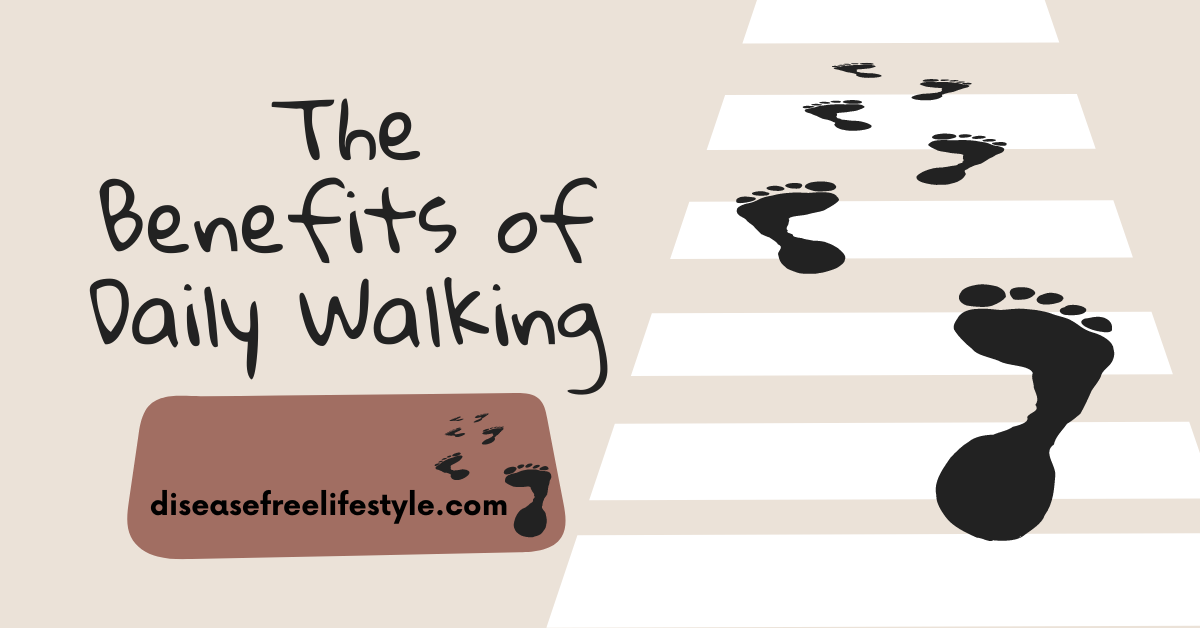Daily Walking, A Golden Step to a Disease-Free Lifestyle
Among healthy habits, daily walking stands out as an easy, accessible, and highly effective form of exercises. In our quest for a disease-free lifestyle, simple habits often hold the key to profound health benefits. Incorporating a daily walk into your routine can significantly enhance your physical and mental well-being. This article explores the unique benefits of this accessible activity and how it can lead to a healthier life.
Physical Health Benefits of Daily Walking
1. Cardiovascular Health:
Daily walking is an excellent way to improve cardiovascular health. Regular walking helps to strengthen the heart, improve circulation, and lower blood pressure. This better circulation delivers oxygen and nutrients to your organs, including your heart itself. Regular walking strengthens your heart muscle which can pump blood more efficiently with each beat, reducing strain and improving overall cardiovascular function. It reduces the risk of heart disease and stroke by increasing the levels of HDL (good cholesterol) and reducing levels of LDL (bad cholesterol).
2. Weight Management:
Walking is a low-impact exercise that aids in weight management. It helps burn calories, reduces body fat, and increases muscle tone. For those looking to maintain or lose weight, incorporating a brisk 30-minute walk into the daily routine can make a significant difference.
3. Bone and Joint Health:
Walking strengthens bones and improves joint function. It is particularly beneficial for older adults as it helps prevent osteoporosis and arthritis. The gentle impact of walking stimulates and maintains bone density, contributing to overall skeletal health.
4. Improved Digestion:
A regular walking routine enhances digestive health. Remember indigestion is the source of many diseases. Walking helps regulate bowel movements and reduces the risk of digestive disorders. It stimulates the digestive system, aiding in better digestion and absorption of nutrients.
Mental Health Benefits of Daily Walking
1. Stress Reduction:
Walking is a natural way to reduce stress and anxiety. It promotes the release of endorphins, the body’s natural mood lifters. A daily walk, especially in nature, can significantly lower stress levels and improve mental clarity.
2. Enhanced Creativity and Focus:
A walk can boost creativity and focus. Many studies suggest that walking, particularly in natural environments, can enhance creative thinking and problem-solving skills. It provides a mental break and refreshes the mind, making it easier to concentrate on tasks.
3. Delta Level Sleeping:
Regular physical activity like walking can improve the quality of sleep. It helps regulate sleep patterns and reduces insomnia. A brisk walk in the evening can help you unwind and prepare for a restful night’s sleep. Try to maintain the famous quote: “Early to bed and early to rise makes a man healthy, wealthy and wise.”
Tips for Incorporating Daily Walking into Your Routine
1. Set Realistic Goals:
Start with realistic goals to incorporate walking into your daily routine. Aim for at least 30 minutes of walking each day. You can break it into shorter sessions if needed. Remember, If you want to accomplish the goals of your life, you have to begin with the spirit.
2. Choose the Right Footwear:
Invest in comfortable walking shoes to prevent injuries and enhance your walking experience. Proper footwear provides the necessary support and cushioning for your feet. If you feel comfortable then you can enjoy your daily walking.
3. Make It Enjoyable:
Make walking enjoyable by listening to music, podcasts, or audiobooks. You can also walk with a friend or join a walking group to make it a social activity. I prefer group walking to individual walking.
4. Explore Different Routes:
Vary your walking routes to keep the experience interesting. Explore parks, trails, or different neighborhoods to enjoy new scenery and stay motivated. You can prefer to go to the countryside or outskirts of your city.
5. Track Your Progress:
It’s very necessary and crucial to start with clear, short and specific goals to track your progress effectively. Use a pedometer or a fitness app to track your steps and monitor your progress. A Natural Boost for Your Heart Walking is a cardiovascular exercise that strengthens the heart. Regular walkers have a lower risk of heart diseases as it helps in maintaining blood pressure and cholesterol levels. The rhythmic stride and increased heart rate during a walk are nature’s way of keeping your heart fit. Setting goals and seeing your progress can be motivating and rewarding.
Conclusion
Incorporating daily walking into your routine offers a myriad of benefits for a disease-free lifestyle. From improving cardiovascular health and aiding in weight management to reducing stress and enhancing mental clarity, walking is a powerful tool for overall wellness. By setting realistic goals, choosing the right footwear, making walking enjoyable, exploring different routes, and tracking your progress, you can easily make daily walking a part of your life. Embrace the simplicity and effectiveness of walking to pave the way towards a healthier, happier you. In the hustle of modern life, finding time for exercise can be a challenge. However, the simple act of daily walking can be a powerful tool in maintaining a disease-free lifestyle.
N.B:
This article is for informational purposes only and should not be considered as medical advice. Always consult with a healthcare professional before making any changes to your lifestyle or treatment plan.










